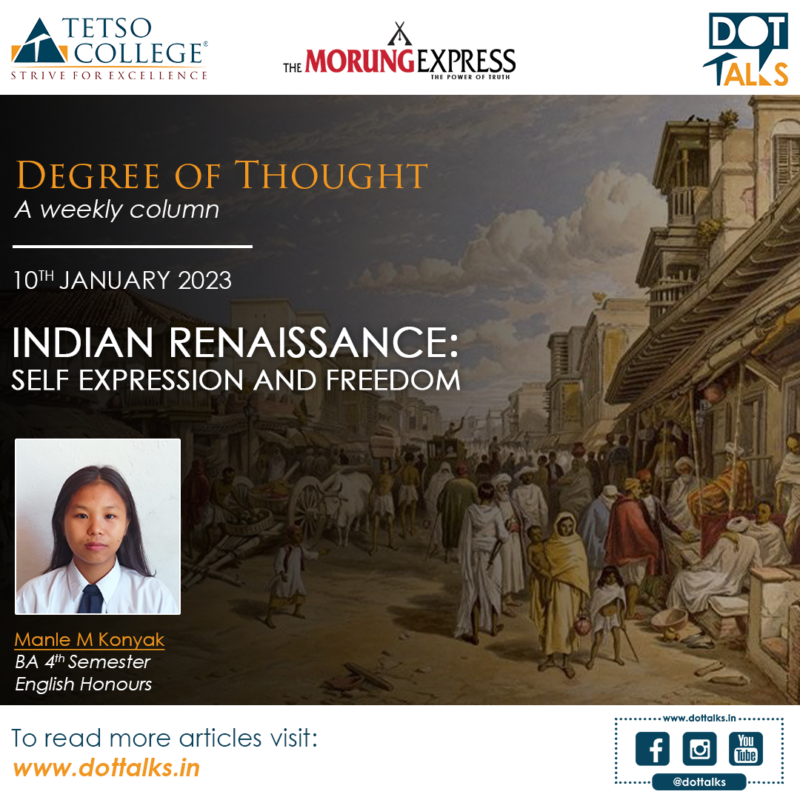 The Renaissance brought about change in the fields of literature, science, philosophy, culture, and politics all across the nation. This article explains how the Renaissance arrived in India, the movement it birthed, and how it revolutionized India toward a better future and freedom.
The Renaissance brought about change in the fields of literature, science, philosophy, culture, and politics all across the nation. This article explains how the Renaissance arrived in India, the movement it birthed, and how it revolutionized India toward a better future and freedom.
Indian Renaissance: Self Expression and Freedom
Renaissance has now become a familiar word to many. Originating in Italy during the sixteenth century, it spread throughout Europe over the following two centuries. The Renaissance initially meant the revival of classical art, architecture, literature, and learning. Over time, it took various
forms, expanding its values and repercussions. People started to reason and sharpen their intellect, which helped these polyhistors grow more in their intellectual thinking and subjectivity.
In the case of India, the Renaissance planted its roots pretty late. Maybe it was because of the growing superstitions and false beliefs of the people, so deeply rooted and watered by their helplessness and fear of colonial rule, that the Renaissance couldn’t penetrate the nation’s minds.
The Renaissance in India began during the nineteenth century. It was a period of intellectual salvation and a massacre of their false beliefs. This revolution changed and affected the nation in the fields of literature, science, philosophy, culture, and politics.
There were many causes that spawned the shadow of the Renaissance over India. The British colonial rule at the time inspired this movement; their concepts of reason and liberty questioned their own. The growing education centres and the limited availability of literature also helped establish the movement in the long run. English, being a colonial language, acted as a medium for disseminating the growing revolution. The degradation of their own cultures and the growing oppression started to remove the fog from their minds. The people of India began to try to find their own expressions and began to replace their agony and frustration with the growing embrace of nationalism and material emancipation.
The nineteenth-century religious and social reform movements contributed to the growth of nationalism. The perspectives of the citizens on freedom were inconsistent, but the sense of oppression under colonial rule provided a common bond that linked their goals. There was a quest for finding the true identity of India, the nation that was ruled in the past by various rulers of different values, identities, and ideals. People began to realise their degrading values and identity crises. They felt the need to represent and express themselves freely, and in order to achieve this, they drew themselves back into the nation’s history, found faults, fixed them, and worked towards overcoming the contemporary problems. Raja Ram Mohan Roy, who is also known as the “Father of Indian Renaissance,” and other intellectuals propagated these movements and pushed them even farther. They shunned the inhumane practises prevailing in Indian society that only dragged the nation deeper into the depths of ignorance and darkness.
The Renaissance was India’s first step towards finding self-expression and gaining freedom. It affected all spheres of the nation equally. India has come a long way in her process of modernization, and the Renaissance has strongly contributed to it.
It gave people a new hope for a better life, and after decades of being puppets under foreign rule, they began to make an effort to rekindle the nation through the revival of culture and art.
Degree of Thought is a weekly community column initiated by Tetso College in partnership with The Morung Express. Degree of Thought will delve into the social, cultural, political and educational issues around us. The views expressed here do not reflect the opinion of the institution. Tetso College is a NAAC Accredited UGC recognised Commerce and Arts College. Currently, the Degree of Thought Column is managed by the Department of Mass Communication, and the editorial team are Dr. Jenny Lalmuanpuii, Asst. Professor; K.C. Gabriela, Asst. Professor; and Rinsit Sareo, Asst. Manager, IT, Media & Communications.
For feedback or comments please email: dot@tetsocollege.org

